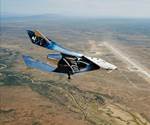SpaceShipTwo completes second test flight
The VSS Unity’s second glide test continues collecting system evaluation and vehicle performance data to prepare the aircraft for powered spaceflights.

Virgin Galactic's carrier aircraft, VMS Eve and VSS Unity, take to the skies. Source | Virgin Galactic
Virgin Galactic Holdings Inc. (Mojave, Calif., U.S.) announced on June 25 the successful completion of its second SpaceShipTwo test flight from Spaceport America (Las Cruces, N.M., U.S.). This flight follows the completion of the aircraft’s first test flight from the company’s commercial headquarters in New Mexico on May 1, 2020 (see “SpaceShipTwo completes New Mexico glide test”) and marks another milestone toward the launch of Virgin Galactic’s commercial service.
On SpaceShipTwo Unity’s flight deck were Mark ‘Forger’ Stucky and Michael ‘Sooch’ Masucci. According to the company, the pilots are commercial astronauts, having each previously flown Unity into space on different flights. Piloting the Company’s carrier aircraft, VMS Eve, were Nicola Pecile and CJ Sturckow.
Flying VSS Unity in glide configuration at higher speeds enabled certain vehicle systems to operate close to the environment seen during phases of rocket boost on a spaceflight, allowing the team to continue evaluating systems and vehicle performance. Forger and Sooch also performed a series of maneuvers with Unity designed to gather data about performance and handling qualities at higher speeds, which Virgin Galactic says will be verified against similar maneuvers that were performed in the previous glide flight to enhance aerodynamic modeling.
The test flight was also reportedly conducted under a set of stringent operational protocols to ensure safety against COVID-19, including changes to the work areas and procedures to enforce physical distancing, as advised by state guidelines, as well as universal mask usage.
Pending the completion of an extensive data review of this flight, Virgin Galactic says the team will start preparing for the next stage of its flight test program — powered spaceflights from Spaceport America. In addition to this data review, the company notes it has several steps to complete, including final modifications to the spaceship customer cabin and detailed inspections of the vehicle and systems.
Related Content
-
Next-generation airship design enabled by modern composites
LTA Research’s proof-of-concept Pathfinder 1 modernizes a fully rigid airship design with a largely carbon fiber composite frame. R&D has already begun on higher volume, more automated manufacturing for the future.
-
Plant tour: Albany Engineered Composites, Rochester, N.H., U.S.
Efficient, high-quality, well-controlled composites manufacturing at volume is the mantra for this 3D weaving specialist.
-
A new era for ceramic matrix composites
CMC is expanding, with new fiber production in Europe, faster processes and higher temperature materials enabling applications for industry, hypersonics and New Space.














.jpg;maxWidth=300;quality=90)

